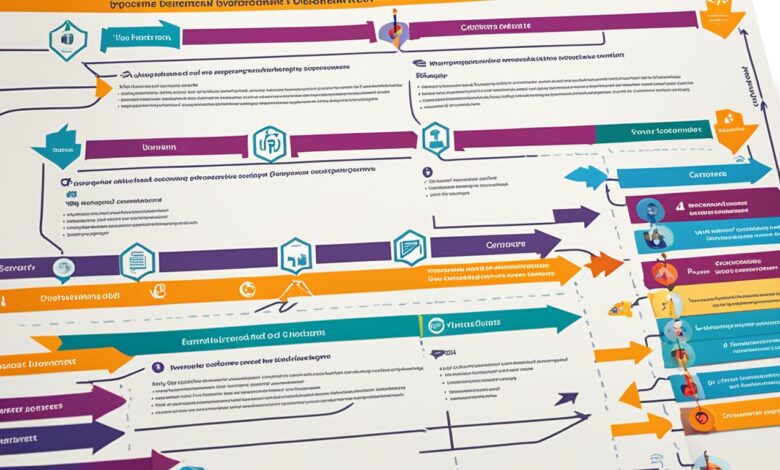Professional Development Examples for Career Growth

Are you looking to boost your career growth? Wondering how you can stay ahead of the competition and achieve your long-term aspirations? The key lies in setting professional development goals that align with your career path. But what are some effective examples of professional development that can propel your success?
In this article, we will explore various professional development examples and career growth ideas that can help you enhance your skills, expand your network, and increase your job satisfaction. From developing new skills and improving workplace competencies to taking on leadership responsibilities and obtaining relevant certifications, we will cover it all. So, let’s dive in and discover the strategies that can unlock your full potential.
Key Takeaways:
- Setting professional development goals is crucial for career advancement.
- Examples of professional development include developing new skills, improving workplace competencies, taking on leadership responsibilities, expanding professional networks, and obtaining relevant certifications or degrees.
- By actively pursuing professional development, you can enhance your skills, create opportunities for growth, and achieve long-term success in your career.
- Remember to set SMART goals – specific, measurable, achievable, relevant, and time-bound.
- Continuous learning, networking, and focusing on holistic well-being are key factors in achieving career growth and personal fulfillment.
Developing New Skills
Developing a new skill set is crucial for professional growth and staying relevant in today’s competitive job market. Industries are constantly evolving, and new skills are constantly in demand. By proactively developing new skills, individuals can enhance their expertise and open doors to exciting career opportunities.
Some in-demand skills across various industries include:
- Cloud computing
- Data analysis (artificial intelligence and SQL)
- Management
- UX design
To develop a new skill set, there are several options available:
- Take online or in-person courses: Many reputable platforms and educational institutions offer courses and programs specifically designed to help individuals acquire new skills. These courses often provide structured learning paths and hands-on practical experience.
- Shadow colleagues: Observing and learning from experienced professionals in your field can be a valuable learning experience. By shadowing colleagues, you can gain practical insights, learn best practices, and develop new skills through hands-on experience.
- Pursue further education: For individuals looking for a more comprehensive skill development program, pursuing further education such as certifications or degree programs can be a great option. These programs often provide a deeper understanding of a particular skill or field, allowing for more specialized career opportunities.
When embarking on skill development, it’s important to identify the skills that are most relevant to your industry and career goals. By focusing on in-demand skills, individuals can increase their marketability and ensure they are equipped with the necessary expertise to succeed.
In-Demand Skills Across Industries
| Industry | In-Demand Skills |
|---|---|
| Information Technology | Cloud computing, cybersecurity, data analysis |
| Finance | Financial modeling, risk management, data visualization |
| Marketing | Digital marketing, social media management, content creation |
| Healthcare | Telehealth technology, electronic medical records, healthcare analytics |
Table: In-Demand Skills Across Industries
By developing a new skill set, individuals can position themselves as valuable assets in their respective fields and increase their career prospects. Whether through courses, shadowing, or further education, investing in skill development is a wise decision for long-term professional growth.
Improving Workplace Skills
Improving workplace skills, also known as soft skills or human skills, is essential for career advancement. These skills include effective communication, leadership, empathy, self-awareness, and teamwork. By honing these abilities, professionals can create a strong foundation for success in their careers.
Effective Communication
Effective communication is a vital workplace skill that facilitates collaboration, builds strong relationships, and ensures clarity in expressing ideas and instructions. Professionals can enhance their communication skills by actively listening to others, asking clarifying questions, and adapting their communication style to different audiences. Additionally, attending workshops or online courses focused on communication techniques can provide valuable insights and practical strategies.
Leadership
Leadership skills are highly valued in the workplace, regardless of an individual’s position or title. Developing leadership traits such as vision, decision-making, and team management can help professionals stand out and have a positive impact on their teams and organizations. Participating in leadership development programs, attending seminars, or seeking out mentorship opportunities can contribute to personal growth and enhance leadership abilities.
Empathy
Empathy is a key workplace skill that promotes understanding, collaboration, and effective teamwork. Professionals who demonstrate empathy are more likely to build strong relationships, resolve conflicts, and create a positive work environment. Developing empathy involves actively listening, considering others’ perspectives, and responding with genuine care and understanding.
Self-Awareness
Self-awareness is the ability to understand one’s own strengths, weaknesses, emotions, and impact on others. By cultivating self-awareness, professionals can identify areas for personal and professional growth. Methods for enhancing self-awareness include reflection, seeking feedback from colleagues, and practicing mindfulness or meditation techniques.
Teamwork
Effective teamwork is essential for achieving common goals and fostering a collaborative work environment. Professionals can improve their teamwork skills by actively participating in team projects, being responsive to others’ ideas and feedback, and recognizing and appreciating the contributions of teammates. Engaging in team-building activities and workshops can also promote effective collaboration and strengthen working relationships.
Overall, investing in the improvement of workplace skills such as communication, leadership, empathy, self-awareness, and teamwork is crucial for career advancement and professional growth. By actively seeking opportunities to develop these skills, professionals can enhance their performance, build stronger relationships with colleagues, and increase their chances of advancing in their careers.
Benefits of Improving Workplace Skills
- Enhanced collaboration and teamwork
- Improved relationships with colleagues
- Increased chances of promotion
- Stronger leadership abilities
- Effective communication with stakeholders
- Positive work environment
Developing these skills not only benefits individuals in their current roles but also prepares them for future challenges and opportunities. It is important to continuously invest in the improvement of workplace skills to stay competitive and thrive in today’s dynamic work environment.
Taking on Leadership Responsibilities
Developing leadership skills and taking on leadership responsibilities is a crucial step in professional growth and career advancement. By actively seeking opportunities to lead, individuals not only enhance their own skill set but also demonstrate their commitment to personal development. Leadership responsibilities can range from leading team meetings and spearheading team initiatives to organizing team offsites and guiding and motivating team members.
When individuals take on leadership roles, they have the chance to showcase their ability to inspire and influence others. By effectively leading team meetings, they can drive collaboration, ensure productive discussions, and guide the team towards achieving their goals. Planning and implementing team initiatives allows individuals to exercise their leadership skills by directing the team’s efforts, overseeing project milestones, and fostering innovation.
Organizing team offsites is another important leadership responsibility. These offsites offer an opportunity for team members to bond, brainstorm ideas, and explore new strategies for growth. By taking the lead in organizing these events, individuals can demonstrate their ability to facilitate collaboration, promote team building, and create a positive and engaging work environment.
Furthermore, when individuals actively seek out leadership responsibilities, they enhance their leadership skills, such as effective communication, strategic thinking, and decision-making. These skills are highly valued in organizations and can open doors to career advancement and increased recognition within the company.
Benefits of Taking on Leadership Responsibilities
By taking on leadership responsibilities, professionals can enjoy several benefits:
- Opportunity to develop and strengthen leadership skills
- Enhanced ability to guide and motivate team members
- Increased recognition and visibility within the organization
- Improved communication and collaboration skills
- Expanded professional network and connections
Overall, embracing leadership responsibilities not only contributes to personal growth but also adds value to the company as a whole. Organizations thrive when they have strong leaders who can foster teamwork, drive innovation, and inspire others to reach their full potential. Thus, actively seeking leadership opportunities is a vital step in professional development and a catalyst for career advancement.
| Leadership Responsibilities Examples | Description |
|---|---|
| Leading team meetings | This involves setting the agenda, facilitating discussions, and ensuring that meeting goals are achieved. |
| Planning and implementing team initiatives | Individuals take the lead in identifying and executing strategic initiatives that align with team and organizational objectives. |
| Organizing team offsites | This involves coordinating and planning team-building activities, workshops, or retreats to foster collaboration and strengthen team dynamics. |
Expanding Professional Network
Expanding one’s professional network is essential for continuous learning and career growth. Professionals can attend networking events, join professional groups (both in-person and online), and volunteer their skills to expand their network.
Setting goals such as attending a certain number of events or joining specific professional groups can help individuals proactively build and strengthen their professional connections.
“Networking is not about just collecting business cards; it’s about building lasting relationships.”
-John T. Chambers
Attending networking events provides professionals with valuable opportunities to meet industry peers, potential mentors, and future collaborators. These events often feature industry experts who share insights and facilitate conversations, fostering professional growth.
Joining professional groups allows individuals to connect with like-minded professionals who share similar interests or work in the same field. These groups often organize seminars, workshops, and conferences that provide opportunities for learning, collaboration, and expanding one’s professional network.
Volunteering skills within the professional community not only contributes to personal fulfillment but also opens doors to new connections. By showcasing expertise and willingness to help others, professionals can build a strong reputation and expand their network organically.
Key Benefits of Expanding Professional Network:
- Access to new opportunities: A wide professional network increases the likelihood of hearing about job openings, upcoming projects, and potential collaborations.
- Exchange of ideas: Connecting with professionals from diverse backgrounds and industries enables the exchange of innovative ideas and perspectives.
- Support system: A strong professional network provides a support system of mentors, advisors, and peers who can offer guidance and support throughout one’s career journey.
- Professional development: Engaging with professionals who possess unique skills and knowledge contributes to continuous learning and professional growth.
- Increased visibility: Expanding professional networks helps raise visibility within one’s industry, leading to potential recognition and career advancement.
Expanding Professional Network: Tips and Strategies
- Identify networking events and conferences related to your industry or area of interest and make a goal to attend a certain number of events per year.
- Join online professional communities and actively participate in discussions and forums to connect with professionals from around the world.
- Volunteer your skills or participate in industry-related projects to expand your network and showcase your expertise.
- Take the initiative to reach out to professionals in your field for informational interviews or mentoring opportunities.
- Utilize social media platforms such as LinkedIn to connect with professionals, join relevant groups, and engage in meaningful conversations.
By proactively expanding their professional network, individuals can gain access to new opportunities, acquire valuable insights, and accelerate their professional growth.
Obtaining Relevant Certifications or Degrees
Obtaining relevant certifications or degrees is a strategic step towards enhancing career opportunities and demonstrating expertise in a specific field. Professionals who are committed to skill development should consider pursuing credentials that align with their short-term and long-term career goals.
Setting clear goals is essential when pursuing certifications or degrees. These goals can include earning a certification within a specific timeframe, completing a professional certificate program, or researching degree programs for further education. By setting measurable and achievable goals, professionals can stay focused and motivated throughout their learning journey.
Highlighting these credentials on resumes and online professional profiles is crucial for showcasing commitment to skill development. Prospective employers and industry peers recognize the value of professional certificates and credentials, making them an effective way to stand out in a competitive job market.
When choosing the most suitable certifications or degrees, professionals should consider factors such as industry demand, relevance to their career field, and the reputation of the certifying body or educational institution. Researching and selecting reputable programs ensures that the obtained credentials hold weight and are widely recognized.
Employers often value certifications and degrees as tangible evidence of a professional’s dedication to staying current in their field and continuously developing their skills. These credentials can open doors to new job opportunities, promotions, and salary advancements.
Furthermore, staying up-to-date with professional certifications and degrees is important in fast-evolving industries, where new technologies and practices emerge regularly. By investing in continuous learning and attaining additional qualifications, professionals can maintain a competitive edge throughout their careers.
Continuous Learning through Media Consumption
Continuous learning plays a vital role in professional growth and staying relevant in today’s rapidly evolving industries. Fortunately, there are various forms of media consumption that professionals can utilize to enhance their knowledge and gain valuable insights. By setting goals to consume media such as books, podcasts, and industry expert content, individuals can remain informed and continuously expand their expertise.
Books: A Window into Expertise
Books are an excellent source of knowledge and expertise in a specific field. By reading books related to their industry, professionals can gain in-depth insights from thought leaders and pioneers in their respective fields. Whether it’s a practical guide, a thought-provoking manifesto, or an inspiring biography, books provide a wealth of information that can be applied directly to one’s work. Setting a goal to read a certain number of books in a given timeframe can help professionals stay on track and continuously broaden their knowledge base.
Podcasts: Learning on the Go
Podcasts offer a convenient way to learn while on the go. With an extensive range of topics and industry-specific shows, professionals can access valuable insights and expert interviews with ease. Subscribing to podcasts relevant to their field allows individuals to stay updated with the latest trends, best practices, and success stories. By incorporating podcast listening into their daily routines, professionals can consume media and acquire knowledge effortlessly, maximizing their time and turning daily commutes or workouts into valuable learning opportunities.
“Podcasts are a great way to gain exposure to new ideas and expand your perspective. They’re like having a mentor or expert speaker right in your ear, sharing valuable insights and experiences.”
Industry Experts: Following the Thought Leaders
In today’s digital era, industry experts and thought leaders often share their knowledge and insights on various platforms, including social media. By following and engaging with these experts on platforms like Twitter, professionals can gain access to a steady stream of valuable information and industry trends. Setting a goal to follow and actively engage with a select group of industry experts can help individuals stay connected, discover new perspectives, and benefit from the collective wisdom of those at the forefront of their field.
By embracing continuous learning through media consumption, professionals can stay ahead of the curve, improve their work performance, and remain relevant in their industries. Whether it’s through books, podcasts, or following industry experts, setting goals and allocating time for media consumption ensures that individuals are consistently expanding their knowledge and staying informed.
Enhancing Job Satisfaction
Job satisfaction extends beyond career achievements and promotions. It encompasses various factors that contribute to overall well-being and contentment in the workplace. By prioritizing work-life balance, fostering positive workplace relationships, and taking care of mental and physical health, professionals can elevate their job satisfaction and enhance their work performance.
Creating and maintaining healthy workplace relationships is vital for job satisfaction. Professionals can set goals to schedule regular interactions with coworkers, whether through team-building activities, casual conversations, or collaborative projects. Building strong connections and a supportive network within the organization can foster a sense of belonging, create a positive work environment, and provide opportunities for collaboration and growth.
Work-life balance plays a crucial role in job satisfaction. It is essential to establish clear boundaries between work and personal life to prevent burnout and maintain overall well-being. Professionals can set goals to prioritize self-care, allocate time for personal interests and hobbies, and disconnect from work-related activities during non-working hours. Striking a balance between professional responsibilities and personal life allows individuals to recharge, leading to increased job satisfaction and productivity.
Mental and physical health are integral components of job satisfaction. Prioritizing self-care activities, such as regular exercise, mindfulness practices, and maintaining a healthy lifestyle, can significantly impact overall well-being. Professionals can set goals to engage in activities that promote mental and physical health, such as attending wellness seminars, participating in stress management workshops, or incorporating exercise into their daily routines. By investing in self-care, individuals can enhance their job satisfaction and meet the challenges of the workplace with resilience and vitality.
“Maintaining a healthy work-life balance and fostering positive workplace relationships are key to enhancing job satisfaction and overall well-being.” (source)
Enhancing job satisfaction is essential for personal fulfillment and long-term career success. By prioritizing work-life balance, nurturing positive workplace relationships, and taking care of mental and physical health, professionals can create a fulfilling and harmonious work environment. Setting goals in these areas can help individuals achieve a sense of satisfaction and well-roundedness in their professional lives.
Key Takeaways:
- Job satisfaction is influenced by factors beyond career achievements and promotions.
- Building positive workplace relationships is crucial for job satisfaction.
- Striving for work-life balance enhances job satisfaction and overall well-being.
- Mental and physical health play a significant role in job satisfaction.
- Setting goals in areas like work-life balance and self-care can promote job satisfaction.
Conclusion
Setting professional development goals is an essential step in achieving career growth and personal fulfillment. By identifying specific objectives, individuals can enhance their skills, expand their professional network, take on leadership roles, and improve job satisfaction. It is crucial to regularly assess and adjust these goals to align with evolving career aspirations.
Career development involves continuous learning, the proactive building of professional relationships, and prioritizing personal well-being. By consistently seeking opportunities for growth and self-improvement, professionals can pave the way for long-term success in the professional realm.
Remember, achieving professional growth is a journey that requires dedication and perseverance. With a clear vision and well-defined goals, individuals can navigate their careers effectively and unlock their full potential.







